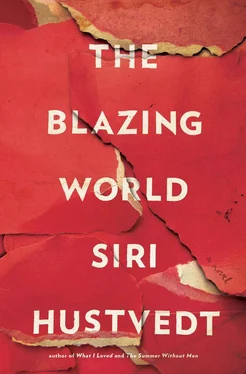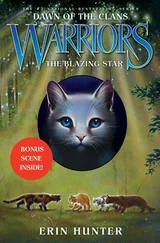One evening, however, while I was watching the footage from a day’s filming, I found myself scrutinizing a pile of rags beside Esperanza’s mattress. I noticed that there were objects carefully tucked in among the fraying bits of colored cloth: rows of pencils, stones, matchbooks, business cards. It was this sighting that led to the “explanation.” She was keenly aware that the world at large disapproved of her “lifestyle,” and that there was little room left for her in the apartment, but when I asked her about the objects among the rags, she said that she wanted to “keep them safe and sound.” The rags were beds for the things. “Both the beds and the ones that lay down on them,” she told me, “are nice and comfy.”
It turned out that Esperanza felt for each and every thing she saved, as if the tags and torn sweaters and dishes and postcards and newspapers and toys and rags were imbued with thoughts and feelings. After she saw the film, my mother said that Esperanza appeared to believe in a form of “panpsychism.” Mother said this meant that mind is a fundamental feature of the universe and exists in everything, from stones to people. She said Spinoza subscribed to this view, and “it was a perfectly legitimate philosophical position.” Esperanza didn’t know anything about Spinoza. I’m aware that my film is a tangent, but I’m talking about it because I think it’s important. My mother believed and I believe in really looking hard at things because, after a while, what you see isn’t at all what you thought you were seeing just a short time before. Looking at any person or object carefully means that it will become increasingly strange, and you will see more and more. I wanted my film about this lonely woman to break down visual and cultural clichés, to be an intimate portrait, not a piece of leering voyeurism about a woman’s horrible accumulations.
My parents first saw Esperanza at a screening in 1991. Father was polite, but I think the images of the woman’s squalor pained him. He found the subject matter “difficult.” He also said he was glad celluloid didn’t smell. He had a point. Esperanza’s apartment stank. My mother loved the film, and although she routinely cheered on my ventures, I knew her enthusiasm was real. My father’s reticence hurt me, and I suppose bringing up Esperanza again at the dinner amounted to a challenge. I wanted to show him that I had known what I was doing, that I had an aesthetic point of view. Oscar talked about hoarding, anxiety, and obsessive-compulsive disorder, and my father noted with some amusement that two years after he had seen my film, he saw Anselm Kiefer’s Twenty Years of Solitude , a work that included stacks of books and papers stained with the artist’s semen, and he had thought of my film. Kiefer’s masturbatory remnants had been mostly met with embarrassment or silence in the art world. Father offered that the woman’s piles of junk were no more disturbing than Keifer’s “private ejaculations.”
My parents disagreed about the semen stains. My mother wondered why the personal theme of the work should be shunned, why a man’s masturbation, his loneliness and sadness were somehow outside “art.” She was emphatic. She said you had to make a distinction between what you saw — stains — and its identification as human waste. My father found the stain business self-indulgent and repugnant. Oscar, who is usually pretty phlegmatic, said the work sounded stupid, really stupid. I said I wasn’t sure, I hadn’t seen the show. This meant that my mother was alone defending semen against two men, who had been producing it regularly over the years. I remember thinking it was fortunate that their emissions had hit the mark at least a couple of times. Mother worked herself up, becoming both more articulate and more irritated. My father’s age-old technique was simply to change the subject, which would further infuriate my mother, who would then cry out, “Why don’t you answer me?”
I was twenty-six years old, married and pregnant, and still I found the tension between my parents intolerable. My mother hung on to her passionate defense while my father, embarrassed, glanced around the room and wished she would stop. A thousand times I had witnessed the same scene, and each one of those times, I had felt my own anxiety mount until it felt as if I would break into pieces. Anselm Kiefer’s semen wasn’t really the issue, of course. After all the years of their marriage, my parents continued to misread each other. My father didn’t like conflict in any form, and so, when my mother came out swinging, he ducked. My mother, in turn, interpreted his avoidance as condescension, and it drove her to punch harder. I understood them both. My father could be maddeningly evasive and my mother annoyingly persistent.
Their verbal brawl ended when I yelled, “Stop it!” My mother apologized by kissing my cheek and neck, and we all recovered pretty quickly from the dried-semen debate, but I did notice that my father’s face was drawn and tired, and that the age difference between my parents had begun to show. Mother looked robust and still young, and Father a bit wizened and white. After dinner, he smoked a cigarette as always and then another and another. I had given up nagging him to quit. The smoking Dunhill was part of his body, his posture, two fingers aloft, smoke circling in the vicinity of his face. It was also the only sign that my father was nervous. Nothing else about him was nervous. He didn’t jiggle or tap or tic. He was calm and contained always, but he smoked, as they say, like a chimney.
After dinner, we went into the other room for a brandy, which my mother and I did not drink, but Oscar and my father did. My mother was silent then, as she often was, weary, I think, from her heated defense of sperm art and content to listen. There were candles and a vase with peach-colored roses on the low table and some chocolates. I remember these details because it was the last time I saw my father alive. Every moment during that evening has become magnified by his death. I didn’t expect to lose him. I thought he would be a grandfather to my child, and I believed my parents would fight on, would annoy each other for many more years and grow old and crotchety together. Isn’t it funny how we just think things will go on as they are?
I can’t remember how we strayed onto ghosts and magic, but it wasn’t very far from our earlier themes: my Lower East Side panpsychist’s collection and an artist’s peculiar habit of saving bodily fluids on paper, as if the marks that remained had some mysterious value or power. My mother said that when she was a girl, she used to look at her dolls in the morning to see if they had moved at night. She had half hoped and half feared they would come alive. Then my father brought up Uncle and his spirits. Uncle had worked for my great-grandparents in Chiang Mai, a skinny but muscular old man, covered from his neck to his feet with tattoos that had wrinkled along with his thin brown skin, and whose teeth had turned black from chewing betel nuts. I had heard about Uncle since I was a child. I had seen pictures of my great-grandparents’ beautiful old house, which rose up from stilts with its gabled roof and curving eaves, and the spacious grounds Uncle had tended.
My father’s eyes narrowed as he told the story. He was ten years old and living with his grandparents in Chiang Mai while his mother and father “traveled.” He had never known why they left him. Neither of his parents had ever given him a straight answer, but his childhood had always involved traveling and multiple nannies, all of whom had dropped hints about his mother’s “adventures” and given him pitying looks.
My father’s big room had a view of the garden and was visited regularly by small gray lizards, and a boy, Arthit, who worked for the family, had slept on a palette at the foot of my father’s bed, for company, because Thais never slept in a room alone. My father had followed Uncle around without being able to converse much with him, but as his Thai improved, he began to understand the old animist’s stories. Uncle told him about a beautiful girl whose fiancé had drowned in the Mekong River. Distraught with grief, she hanged herself, and after that her spirit haunted a tree. Uncle had seen her, a floating head only — dangling entrails from the neck. He also told my father about a ghost his mother had heard and seen, a fetal ghost that cried out in the forest from the place where his mother had miscarried him, a half-formed little monster that sought revenge for his early end by harassing the living.
Читать дальше












